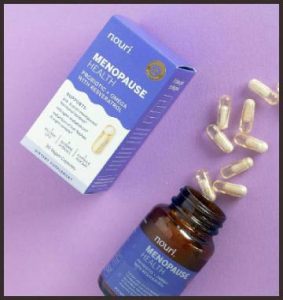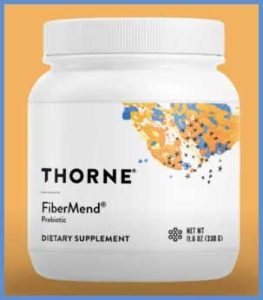I’ve been on a mission to find the perfect collagen supplement, and after countless cups of coffee spiked with powder, I’m ready to share my journey comparing Alaya Collagen and Vital Proteins.
My goal?
To break down what makes each stand out, weigh their strengths and weaknesses, and help you decide which might fit your wellness routine. From taste to sourcing, I’ve left no scoop unturned, blending personal experience with hard facts to give you a clear picture.
Let’s get into it—you’re about to find your collagen match.
A Brief Comparison Table
| Feature | Alaya Collagen | Vital Proteins |
| Collagen Types | I, II, III, V, X | I, III |
| Source | Bovine, chicken, fish, eggshell | Bovine (some marine options) |
| Serving Size | 9.6g (1 scoop) | 20g (2 scoops) |
| Protein per Serving | 8g | 18g |
| Added Ingredients | MSM, glucosamine, chondroitin | Hyaluronic acid, vitamin C (in Advanced) |
| Flavors | Unflavored, Raspberry Lemonade | Unflavored, Chocolate, Vanilla, more |
| Price (Approx.) | $50 for 40 servings (~$1.25/serving) | $47 for 27 servings (~$1.74/serving) |
| Certifications | None listed | NSF, Whole30-approved (select products) |
| Solubility | Good in hot drinks, fair in cold | Excellent in hot/cold drinks |
| Third-Party Testing | Not specified | Yes (NSF, cGMP) |
Why I Started This Collagen Quest?
Collagen caught my attention a few years back when my knees started creaking like an old wooden floor. I’d heard the buzz—stronger nails, shinier hair, happier joints—and I wanted in.
But with shelves packed with options, I narrowed it down to two heavyweights: Alaya Collagen and Vital Proteins.
Both promised to turn back the clock on my body’s wear and tear, but I needed to know which delivered. I’ve spent months mixing, sipping, and researching, and I’m here to spill what I’ve learned in a way that’s real and relatable.
Breaking Down Alaya Collagen
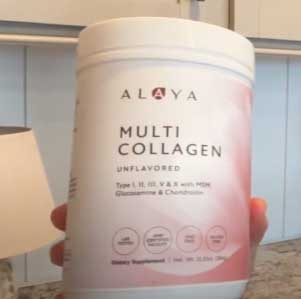
Alaya’s Multi Collagen Powder grabbed me with its bold claim: five collagen types (I, II, III, V, X) from four sources—bovine, chicken, fish, and eggshell.
That’s a wider net than most brands cast, and I was intrigued.
Each 9.6-gram scoop packs 8 grams of protein, plus a joint-support trio of MSM, glucosamine, and chondroitin.
I figured this could be a one-stop shop for my achy knees and brittle nails.
Pros of Alaya Collagen
First, the variety of collagen types is a standout. Type I and III are great for skin and hair, but Type II targets cartilage, and Types V and X support deeper tissues like tendons and bones.
If you’re after whole-body benefits, this mix feels like a full-court press. I also liked the added joint ingredients. MSM (methylsulfonylmethane) has anti-inflammatory vibes, while glucosamine and chondroitin are old-school joint soothers.
After a month of daily scoops, my knees felt less cranky during morning runs—not a miracle, but noticeable.
The sourcing is another win. Alaya uses grass-fed, hormone-free bovine, wild-caught fish, and free-range chickens. I’m picky about where my food comes from, so this checked a box. The unflavored version dissolved decently in my coffee, with no gritty aftermath.
For those who like a twist, the Raspberry Lemonade flavor was refreshing, though a tad sweet for my taste.
Price-wise, at about $1.25 per serving, it’s not the cheapest, but the multi-source formula and extras make it feel like a fair deal. I also appreciated the 40-serving tub—less frequent reordering is always a plus.
Cons of Alaya Collagen
But it’s not all rosy. The 8 grams of protein per scoop felt light compared to competitors. If you’re counting on collagen for a protein boost, you might need a double scoop, which hikes the cost.
Solubility in cold water was hit-or-miss; I’d get clumps if I didn’t stir like my life depended on it. Hot drinks? No issue. Cold smoothies? Brace for a workout.
Another gripe: no third-party certifications. In a world where brands flaunt NSF or Informed Sport badges, Alaya’s silence on testing makes me pause. I want proof my supplement’s clean, especially with fish and eggshell in the mix—potential allergens for some.
Speaking of, the powder’s not vegan-friendly, which isn’t a dealbreaker for me but could be for you.
The flavor options are limited too. Unflavored works for versatility, but Raspberry Lemonade was the only other choice. If you’re not a fan, you’re stuck.
Lastly, some reviews mentioned a faint fishy smell in the unflavored powder. I didn’t notice it often, but when I did, it wasn’t exactly a morning mood-lifter.
Digging Into Vital Proteins
Vital Proteins is the rockstar of collagen, with a fanbase that includes celebs and fitness buffs. Their Collagen Peptides, the flagship product, focus on Types I and III from grass-fed bovine, delivering 18 grams of protein per 20-gram serving.
The Advanced formula tosses in hyaluronic acid and vitamin C, which I was excited to try for skin perks.
Pros of Vital Proteins
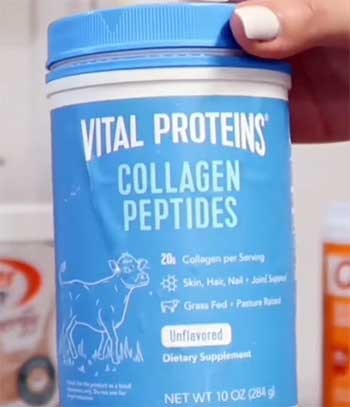
Right off the bat, the protein content impressed me.
At 18 grams per serving, it’s a solid addition to my diet, especially on days I’m rushing and skip breakfast.
The Advanced formula’s hyaluronic acid and vitamin C are smart adds—hyaluronic acid keeps skin plump, and vitamin C boosts collagen synthesis.
After two months, my skin felt softer, and my nails weren’t splitting as often.
Coincidence? Maybe, but I’ll take it.
Solubility is where Vital Proteins shines.
Whether I mixed it into iced tea or hot oatmeal, it vanished without a trace—no clumps, no grit.
The unflavored version was truly tasteless, which I loved for keeping my recipes untouched.
If you’re into flavors, they’ve got plenty: Chocolate, Vanilla, Strawberry Lemon. The Chocolate one made my protein shakes feel like dessert.
Vital Proteins also brings credentials. NSF certification and cGMP compliance mean they’re tested for purity, which gives me peace of mind. Their Whole30 approval is a nod to clean ingredients—no artificial junk here.
At $1.74 per serving, it’s pricier, but the 20 grams of collagen and third-party testing justify the cost for me.
The brand’s versatility is another perk. They offer stick packs for travel, capsules for powder-haters, and even collagen water. I tossed a stick pack in my gym bag, and it saved me on long days.
Plus, their bovine collagen is grass-fed and pasture-raised, aligning with my preference for ethical sourcing.
Cons of Vital Proteins
Nothing’s perfect, though. The focus on Types I and III means you’re missing Type II for joints and Types V and X for deeper tissues. If joint health is your priority, you might need another supplement.
I noticed my knees didn’t improve as much as with Alaya, which was a bummer.
The price stings too. At $47 for 27 servings, it’s not budget-friendly, especially if you’re doubling up for extra collagen. Some flavors, like Strawberry Lemon, tasted artificial to me—fine in a smoothie but weird in plain water.
And while the unflavored powder is odorless most times, I caught a slight bovine whiff once or twice, which wasn’t ideal.
Availability can be an issue. Vital Proteins is popular, so stock runs low at stores like Costco or Amazon. I’ve had to hunt for it, which is annoying when you’re hooked.
Lastly, while the Advanced formula adds hyaluronic acid, it’s only 120 milligrams per serving. Studies suggest 200 milligrams for skin benefits, so I wondered if it was underdosed.
Head-to-Head Comparison Alaya Collagen And Vital Proteins
Let’s put these two through the wringer and see how they compare across key factors.
- Collagen Types and Benefits
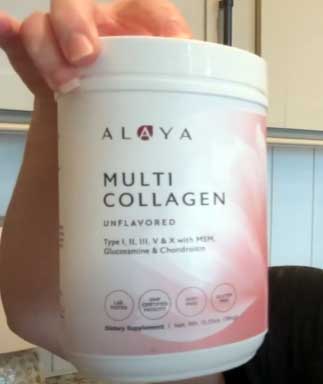
Alaya’s five collagen types give it an edge for comprehensive support.
Type II is a big draw for joint health—my knees thanked me after a few weeks.
Types V and X are rarer in supplements, targeting tendons and bones, which could be great for athletes or older folks.
Vital Proteins sticks to Types I and III, which are fantastic for skin, hair, and nails.
My nails grew faster with Vital Proteins, but my joints didn’t feel the same love.
If you want all-around coverage, Alaya wins; for skin and hair focus, Vital Proteins takes it.
- Sourcing and Quality
Both brands use grass-fed bovine, but Alaya adds wild-caught fish, free-range chicken, and eggshell. That diversity sounds impressive, but without third-party testing, I’m left trusting their word.
Vital Proteins’ NSF certification and cGMP standards make me feel safer, especially since collagen can carry contaminants if not processed right. Vital’s marine collagen option (in other products) is a plus for pescatarians, but their main powder is bovine-only. For transparency, Vital Proteins pulls ahead.
- Taste and Solubility
I’m a stickler for a smooth mix, and Vital Proteins nails it. Hot or cold, it dissolves like a dream, and the unflavored powder never messed with my coffee’s vibe.
Alaya’s unflavored was solid in hot drinks but clumped in cold ones unless I blended it. Taste-wise, Vital’s flavor range is broader, but some felt synthetic.
Alaya’s Raspberry Lemonade was pleasant but limited. If you love options and easy mixing, Vital Proteins is your pick; if you’re okay with basic flavors and hot drinks, Alaya’s fine.
- Price and Value
Alaya’s $50 for 40 servings beats Vital Proteins’ $47 for 27. But Vital delivers more collagen (20 grams vs. 9.6 grams) and protein (18 grams vs. 8 grams) per serving.
Alaya’s joint-support ingredients add value if you’re targeting mobility, while Vital’s hyaluronic acid and vitamin C appeal to skin enthusiasts. It’s a toss-up: Alaya’s cheaper per serving, but Vital gives you more bang per scoop.
Budget shoppers might lean toward Alaya; quality-seekers might not mind Vital’s premium.
- Added Ingredients
Alaya’s MSM, glucosamine, and chondroitin are tailored for joints, and I felt a difference during workouts. Vital’s Advanced formula counters with hyaluronic acid and vitamin C, which my skin seemed to love.
If joint pain’s your nemesis, Alaya’s got the edge; for a glow-up, Vital Proteins is the move. Both add value, but it depends on your goals.
My Personal Experience
I mixed Alaya into my morning coffee for a month, and it became a ritual. The joint benefits were subtle but real—less stiffness after long runs. My skin didn’t change much, but my nails grew stronger.
Switching to Vital Proteins, I noticed smoother skin and faster nail growth, but my knees weren’t as happy. Vital’s Chocolate flavor was a treat, though I stuck to unflavored for simplicity.
Both worked, but Alaya felt better for my active lifestyle, while Vital Proteins suited my vanity days.
Who Should Choose Alaya?
If you’re chasing joint health, Alaya’s your match. The Type II collagen and joint-support trio make it a go-to for runners, lifters, or anyone with creaky bones.
Its multi-source formula is ideal if you want broad benefits without juggling multiple supplements. Budget-conscious? Alaya’s lower price per serving helps. Just be ready to blend cold drinks and overlook the lack of certifications.
Who Should Choose Vital Proteins?
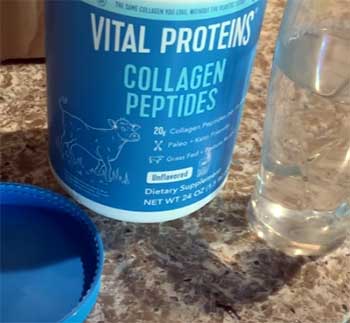
Vital Proteins is for skin and hair lovers.
If you want a glowier complexion or stronger nails, Types I and III plus hyaluronic acid deliver.
Its solubility and flavor options make it user-friendly, and NSF certification seals the deal for quality nerds like me.
It’s pricier, but if you value protein content and trust, it’s worth it.
The Science Behind Collagen
Collagen’s the glue holding our bodies together—skin, bones, tendons, you name it. As we age, production drops, leaving us with wrinkles and achy joints. Supplements aim to fill that gap.
Studies show hydrolyzed collagen (like both brands use) improves skin elasticity and joint pain, though results vary. Alaya’s multi-type approach mimics the body’s natural mix, potentially amplifying benefits.
Vital Proteins’ focus on Types I and III aligns with most research on skin and hair. Neither’s a magic bullet, but consistency seems to pay off.
Potential Side Effects
I didn’t hit any snags with either brand, but collagen can cause mild bloating or fullness in some folks. Alaya’s fish and eggshell sources might trigger allergies, so check labels if you’re sensitive.
Vital’s bovine collagen is generally safe, but heavy doses could upset your stomach. Start slow—half a scoop—and see how you feel. If you’re pregnant or on meds, talk to your doc first.
Tips for Maximizing Collagen
I learned a few tricks to get the most out of these powders. Mix with hot liquids for better dissolving, especially with Alaya. Pair with vitamin C-rich foods (like oranges) to boost absorption—Vital’s Advanced formula already has this covered.
Consistency is key; I saw changes after six weeks, not overnight. And don’t skip strength training—it amplifies collagen’s joint and muscle benefits.
Frequently Asked Questions (FAQ)
It depends on your goals. Alaya’s multi-type formula suits joint health; Vital Proteins excels for skin and nails. Both work with consistent use.
No major lawsuits are currently reported against Vital Proteins as of 2025, but always check recent news for updates.
She’s been linked to the brand as an ambassador, so it’s likely she uses it, but I can’t peek into her smoothie blender to confirm.
Kim’s mentioned collagen supplements but hasn’t named a specific brand recently. No direct tie to Alaya or Vital Proteins.
Wrapping It Up
After months of testing, I’ve seen what Alaya Collagen and Vital Proteins bring to the table. Alaya’s my pick for joint relief and budget-friendly value, while Vital Proteins wins for skin goals and quality assurance.
Your choice hinges on what you need—creak-free knees or a radiant glow. You can’t go wrong with either, but I hope my scoop-by-scoop breakdown helps you find the one that feels right. Give it a try, stick with it, and let me know how it works for you.


